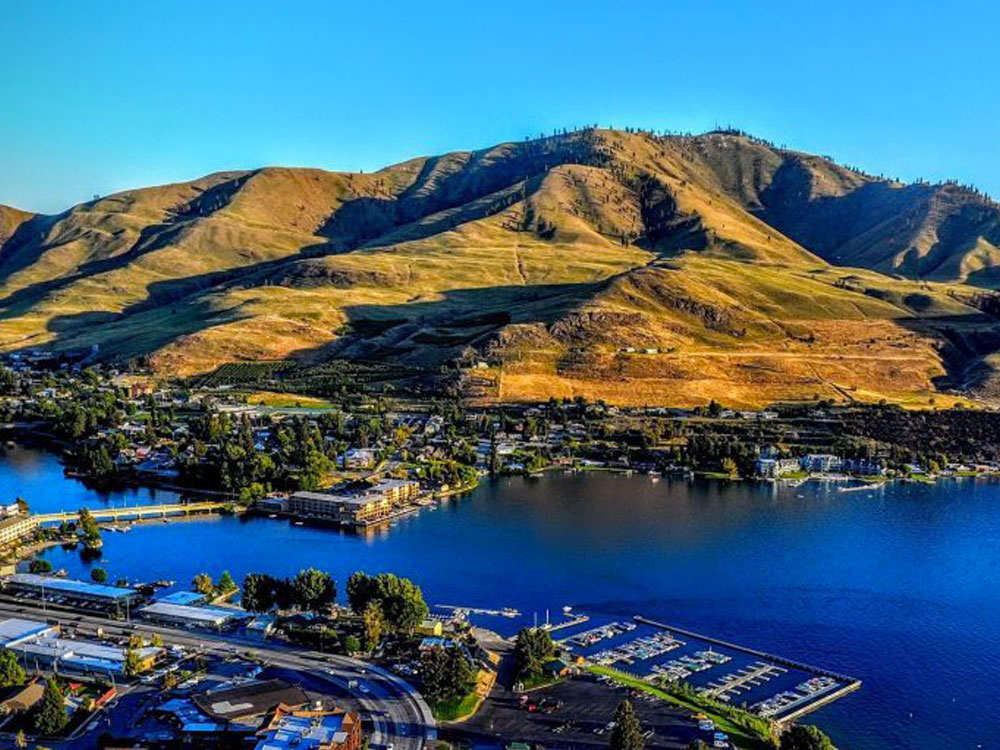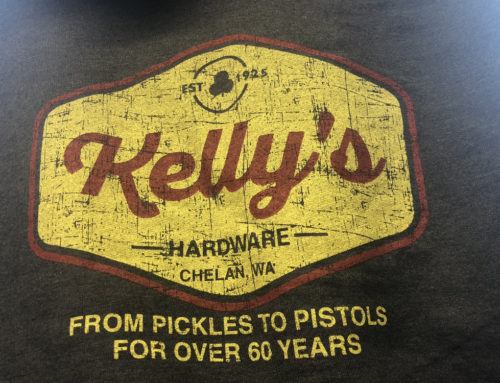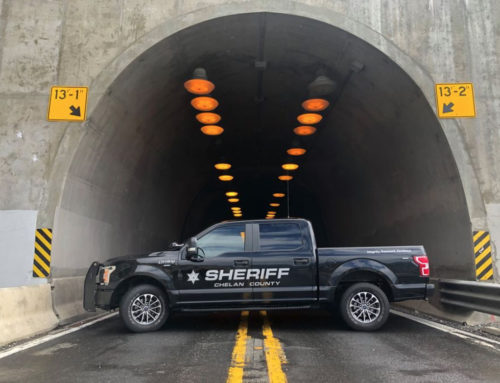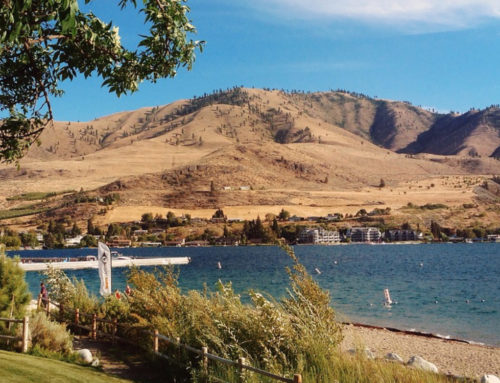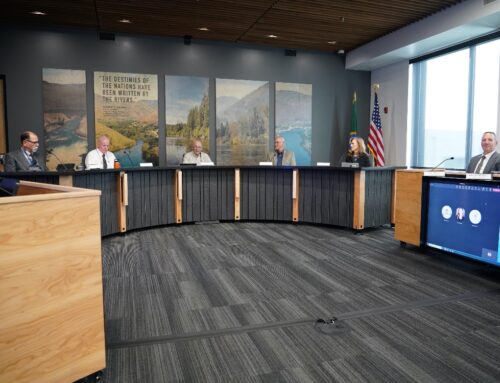General Election three weeks away
intro by Dennis Rahm; Jerry Isenhart photo; Q&A released by CBC
The Chelan Basin Conservancy is a nonprofit organization that promotes conservation of and public access to Lake Chelan. One of their stated key projects is the preservation of the Chelan Butte.
With Chelan residents preparing for the upcoming November 7 General Election, the CBC sought written responses from the two mayoral candidates. Current Mayor Bob Goedde is being challenged by City Council member Erin McCardle.
The CBC submitted four questions and has provided the complete and unedited responses from the two candidates. The public has another opportunity to hear from the mayoral candidates in person this Wednesday from 5:00 p.m. to 7:00 p.m. in the Fireside Lounge at the Apple Cup Cafe.
Chelan Basin Conservancy Q&A
The City of Chelan will have two choices for mayor in the election coming up on November 7, 2023: Current City Councilwoman Erin McCardle and incumbent mayor Bob Goedde. The Chelan Basin Conservancy (CBC) asked four questions of the two mayoral candidates covering the four key project areas currently being pursued by CBC. Below, we provide their written responses verbatim.
CBC does not endorse political candidates, so we have gathered this information for the sole purpose of informing Chelan voters. While we may not agree with all of the answers provided or believe that they all contain correct information, we are not responding to them as part of this exercise. We will, however, continue to reach out to both candidates to advocate for CBC’s interests and provide relevant information.
Anyone wanting to learn more about CBC’s four key project areas can visit our website at www.chelanbasinconservancy.org or contact us directly at chelanbasinconservancy@gmail.com.
CBC wishes to thank both candidates for taking the time to provide the following responses.
Question 1): The preservation of the Chelan Butte is a high priority to many Chelan residents. The City of Chelan has currently bookmarked $500,000 in its Capital Improvement Program (CIP) toward the potential purchase of property on the Butte for public ownership and use. Do you support keeping this $500,000 in the CIP until such time that appropriate property is identified for purchase? What steps do you believe the City of Chelan should take, if any, toward the preservation of the Chelan Butte to prevent it from being developed with dwelling units that current zoning would allow to be used as tourist accommodations?
Erin McCardle’s Response
Yes, absolutely. I do not want to see the Butte developed; however, most of this icon is private property. Hindsight is always 20-20, but this is a great example of how long-range planning, and a set of Core Values from the Community are critical. When the Butte was annexed to the City of Chelan from the County in 2002, council at the time approved the annex with a change in zoning to TA. Comments were predominately solicited from voting homeowners in the annexation boundary area (they were in support) – not the community that may have had a different perspective on the impact of this change in zoning. [Ms. McCardle attached a clip from City Council meeting minutes dated 11/14/02 listing the Council members present, including Bob 2 Goedde, showing that the Chelan Butte properties were annexed into the City by unanimous vote.]
I would also encourage the CBC to use their enormous number of connections and resources to match the City’s commitment of $500,000 so that when we approach the State Legislature for assistance in purchasing The Butte; we have a solid show of support from both City and Citizens. As this is privately owned property, any action taken toward zoning changes must be initiated by the landowner. I do believe that the City of Chelan should continue to work with landowner(s) on the desires of our community for the Butte to remain as undeveloped as possible. I have fully supported the Boundary Line Adjustment moratorium and will support any additional moratoriums to allow the City of Chelan to update any additional outdated codes. Conversations should also continue with landowner(s) that following the standard development practices of the City of Chelan are necessary to retain any community trust. I would also work with our State Legislators to update the antiquated RCW 58.17.040.
Bob Goedde’s Response
I believe the $500,000 should stay in reserve in the Capital Improvement Program where it will help the Planning Commission. I don’t want any resort style development on the Butte.
Question 2): The majority of the shore of Lake Chelan in the Wapato Basin is privately owned, limiting opportunities to create additional public access to the lake. What actions, if any, do you believe the City of Chelan should take to increase public access to Lake Chelan?
Erin McCardle’s Response
I have been and will continue to support several projects that create public access to the Lake: – Street End Park Projects – City Council has identified over 10 locations around the City of Chelan that can be improved to provide public access to Lake Chelan. Additionally, City Council has approved a budget appropriation each year to build out these street end micro parks. – Lakeside Trail Completion – Public Works has recently applied and won a $3M grant (with approved matching funds from the City of Chelan) to complete the Lakeside Trail along the South Shore. Completion of this will provide pedestrian access to several public access points to Lake Chelan (i.e. the small public access area on the Fingers, a few of the micro parks identified in the Street End Park Project). I would also support working with our Planning Commission and City Council to implement an in-liu [sic] fee for smaller waterfront developments (located within the shoreline access boundary), which are required to allocate a certain % to public access. These fees could be used to help fund larger public access projects – ie. Street End Park Project. 3
Bob Goedde’s Response
More public access to Lake Chelan for local residents is very difficult to accomplish. Street ends are very expensive and are small areas with minimal use. One site that might work out is near the Lakeside Trail. There may be some street-ending right of ways that could accommodate small docks.
Question 3): With increased usage of Lake Chelan over the years, the potential proliferation of aquatic invasive species in the lake, particularly zebra and/or quagga mussels, has become a significant concern. In 2023, a voluntary boat inspection program was implemented for Lake Chelan. Knowing that it will take legislative and financial backing, do you support creating a mandatory boat inspection program for Lake Chelan over the next few years?
Erin McCardle’s Response
Yes, I do support a mandatory boat inspection program for Lake Chelan. The State of Washington currently has a mandatory boat inspection program in place, and I would encourage working with our State Representatives to leverage this program to expand check point locations across the state with an emphasis on entry points to the Lake Chelan Valley.
Soliciting support from all signatories of the FERC license will be required – in addition to the City of Chelan; Chelan PUD, Forest Service, Park Service, NOAA National Marine Fisheries Service (NMFS), United States Fish and Wildlife Service (FWS), Washington Department of Fish and Wildlife (Washington Fish and Wildlife), Washington Department of Ecology (Ecology), the Confederated Tribes of the Colville Reservation (Colville Tribes), and American Whitewater.
Bob Goedde’s Response
Lake Chelan has great importance to many of us here in Chelan, and it needs to be protected— from invasive species, Eurasian milfoil, and the hydrogen from lawn fertilizers used by homeowners along the lake. Boat inspection should be mandatory and a great deal of educational information should be distributed.
Question 4): The Washington Department of Ecology (DOE) in 2021 created a program for addressing development of historical orchard lands contaminated with lead and arsenic based on Model Remedies. This program helps protect the health and safety of both current and future residents of Chelan. As part of this program, DOE has requested that local permitting departments incorporate and help manage the Model Remedies requirements within their permitting program to ensure that all development complies with the DOE program. Would you support the incorporation of the requirements to comply with the Model Remedies program into the permitting programs within the City’s Community Development department?
Erin McCardle’s Response
It is my understanding that the Model Remedies mitigation is currently triggered with SEPA review for formal orchard lands. Looking at the State allowed exemption thresholds for SEPA vs. Chelan thresholds, it’s my understanding that the City of Chelan has the most restrictive thresholds currently allowed. [Ms. McCardle provided a table comparing Chelan’s SEPA exemption thresholds to the maximum thresholds allowed by state code]
I would support potentially increasing these threshold levels for the City of Chelan; provided there is clear support on implementing mitigation measures of contaminated soil. Without predetermined mitigation / solutions, there is potential to add substantial cost to the development of homes and/or multi-family housing in a market that is already difficult to build a home to meet the needs of our Missing Middle, Seniors and Farmworkers.
For non-SEPA projects such as one-off residential homes, I would support the Community Development department taking the approach of education (collateral CBC to develop) and including an optional mutual agreement between the city and homeowner noting the possible contamination of soil and providing guidance on remediation options.
Bob Goedde’s Response
The state has created the program of inspecting for lead arsenic based on model remedies for larger projects. Our city should explain lead arsenic hazards to the builders of single-family homes and encourage them to follow the Department of Ecology’s free model remedies program.


